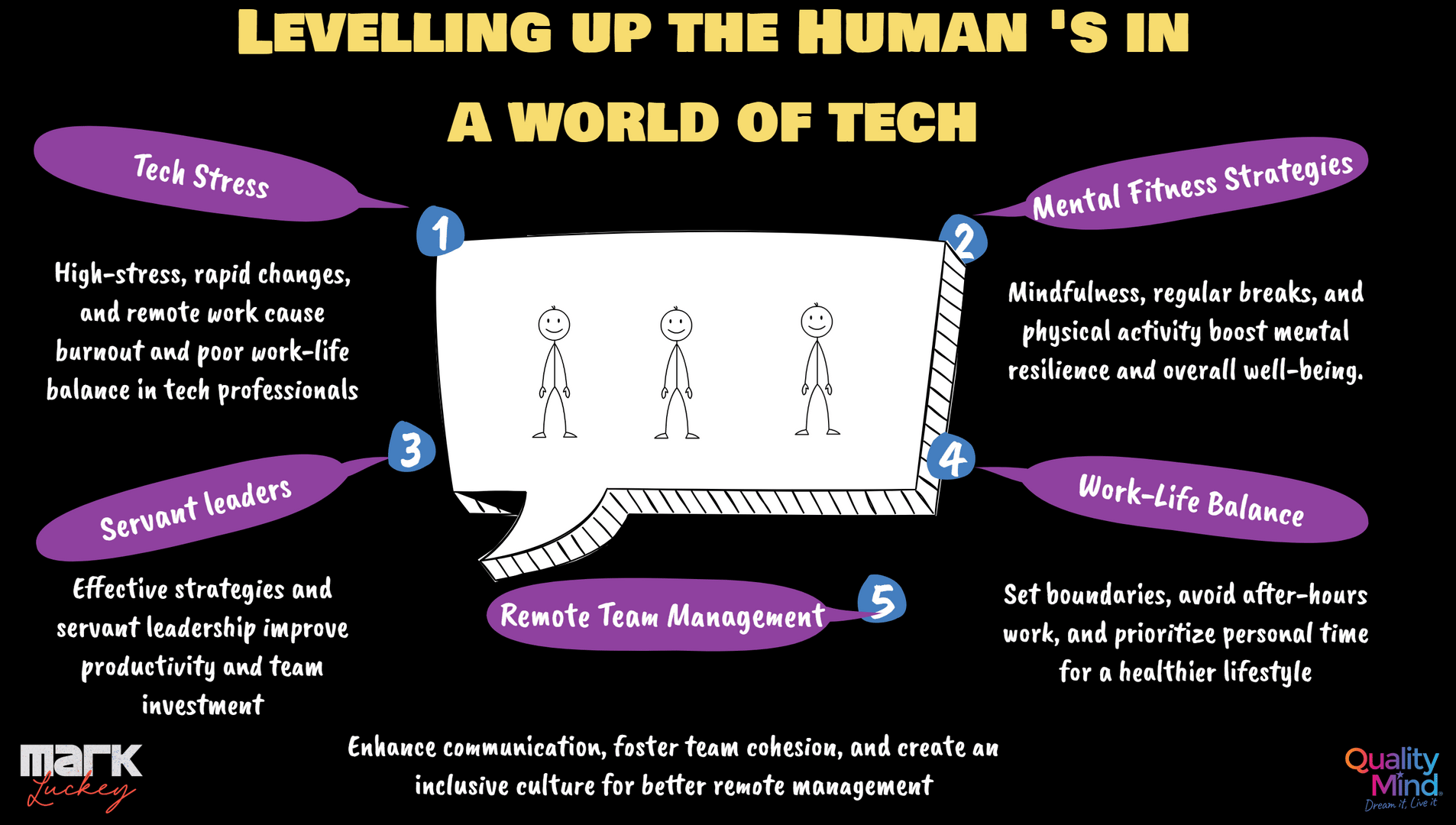Levelling up the Human Performance in a World of Tech
Discover strategies to enhance mental fitness and productivity in tech. Beat burnout, improve remote team management, and foster a resilient workforce.
Reduce Stress and Increase Productivity
“Empty your mind, be formless. Shapeless, like water. If you put water into a cup, it becomes the cup. You put water into a bottle and it becomes the bottle. You put it in a teapot, it becomes the teapot. Now, water can flow or it can crash. Be water, my friend."
Bruce Lee
Introduction
Code monkey? Digital brick layers? The heart and soul code crunchers that keep the world turning (but often get treated like asses?!). I know, I’ve been in tech for 25 years!
Welcome to the digital rat race, where tech companies sprint at the speed of light, leaving a trail of burnout and stress in their wake. It's a jungle out there, but it looks like a scene from Tron.
The relentless pace, high-stress environments, and remote work dynamics often lead to techo’s feeling like overworked hamsters on a wheel. Lading to people feeling under valued and misunderstood.
But I have the magic potion (you don’t need to roll a D&D dice for this one) this is that keeps outputs high and the well-being higher. Time for me to dish out some no-nonsense, actionable insights and strategies for tech companies to level up their human performance in the digital world.
The Stress Factor in Tech
Let's talk about the elephant in the server room – stress. Tech teams are constantly under the pump. From tight deadlines that make your heart race faster than your broadband to the rapid technological changes that make you feel like a dinosaur, the pressure is real. Imagine being in a never-ending episode of Black Mirror where in search of the human touch we get another badly designed UI which wants an update just before we proceed. Welcome to the tech world.
From my 20 years in tech, here’s what I see as the most common factors that can hurt tech teams.
Statistics show that stress and burnout are rampant in the tech industry, especially among middle-sized companies in India. The age group most affected? Those in their 30s and 40s, juggling work and life like they’re auditioning for a circus. According to a study by Assocham, 42.5% of employees in private sector organizations in India suffer from depression or general anxiety disorder.
The greatest weapon against stress is our ability to choose one thought over another."
William James
Mental Fitness Strategies for Tech Employees
So, how do we turn this around? You need a personal trainer for your brain – and a coach! Mental fitness, readiness, resilience is the key. Here are some strategies that tech employees can embrace to stay mentally sharp and resilient. Why not start your day with a short meditation, take a walk during lunch, practice deep breathing exercises, and end your day by unplugging from all devices at least an hour before bed.
"In the beginner's mind there are many possibilities, but in the expert's mind there are few."
Shunryu Suzuki
That old chestnut – its your life, work to live, not live to work. (us old farts have been banging on about this for some time now) Set boundaries. No emails after hours, no work on weekends, put down your freaking phone. And for the love of all things holy, no more Zoom meetings that could’ve been an email. Or in person! Google can do it, why cant you?
Improving Remote Team Management
Managing remote teams is like herding cats – challenging but not impossible. Here’s how you can make it work:
Enhance Communication: Use comms tools sparingly, but don’t overdo it. No one needs 100 notifications an hour. More is not more, well planned is. A study by Buffer found that 20% of remote workers struggle with communication and collaboration.
Foster Team Cohesion: Virtual team-building activities can do wonders. Whether it’s a virtual coffee break or an philosophical discussion game night, keep the team spirit alive. According to Gallup, teams with high engagement levels show 21% greater profitability.
Swap the boss: I love this – one of my fave tools, its builds empathy. Before you bitch and moan about your boss, step in for a day, offer to run a meeting, set the agenda, inspire the team. If you are the boss – invest time in your people.
Create an Inclusive Culture: Make everyone feel included, regardless of where they are, who they are or how they are . This goes beyond, equity, inclusion, diversity and a series of other important keywords; this is about people accepting people in all the colours of their personal glory
Success Stories
Before the pandemic made the world a work from home free for all, I’d been managing remote teams since 2004. I could write articles on this forever.
For managers, be a servant leader; you could improve yourself and get a 30% return on your output, or be smart and invest in your team and get 5% improvement from 10 people.
Try the rotating chair exercise, take turns at running meetings, encourage team members to share, bring something a little personal and fun, sharing their own wins and triumphs. Crochet may not be your thing, but if it works for a staff member, find out why.
Conclusion
To wrap it up, investing in mental fitness is a no-brainer for tech companies. The benefits are clear: increased productivity, reduced burnout, and a happier workforce. So, tech leaders, it’s time to step up. Invest in mental fitness programs and watch your company thrive. Remember, a mentally fit team is a productive team.
Ready to take the plunge? Contact us today for more information or to schedule a consultation. Your team’s mental fitness journey starts here. Let’s make your tech company a place where mental health and productivity go hand in hand.



